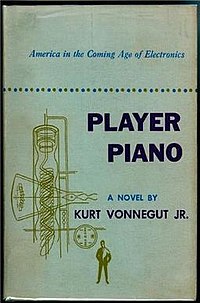Player Piano
by Kurt Vonnegut
Player Piano is set in the near future, after a third world war. While most Americans were fighting overseas, the nation's managers and engineers faced a depleted workforce and responded by developing ingenious automated systems that allowed the factories to operate with only a few workers. The novel begins ten years after the war, when most factory workers have been replaced by machines. The bifurcation of the population is represented by the division of Ilium, New York into "The Homestead," where every person not a manager or an engineer lives, and the other side of the river, where all the engineers and the managers live.
Player Piano develops two parallel plotlines that converge only briefly and then insubstantially, at the beginning and the end of the novel. The more prominent plotline follows the protagonist, Dr. Paul Proteus (referred to as Paul), an intelligent, 35-year-old factory manager of Ilium Works. The secondary plotline follows the American tour of the Shah of Bratpuhr, a spiritual leader of six million residents in a distant, underdeveloped nation.
The purpose of the two plotlines is to give two perspectives of the system: one from an insider who is emblematic of the system, and one from an outsider who is looking in on it. Paul, for all intents and purposes, is the living embodiment of what a man within the system should strive to be, and the Shah is a visitor from a very different culture and so applies a very different context to whatever he sees on his tour.
The main plotline follows Paul's development from an uncritical cog in the system to one of its outspoken critics. Paul's father, George, was the first "National, Industrial, Commercial Communications, Foodstuffs, and Resources Director." George had almost complete control over the nation's economy and was more powerful than the President of the United States. Paul has inherited his father's reputation and social status but harbors a vague dissatisfaction with the industrial system and his contribution to society. His struggle with that unnameable distress is heightened when Ed Finnerty, an old friend whom Paul has always held in high regard, informs him he has quit his important engineering job in Episcopal minister, Lasher, with a M.A. in anthropology, who puts into words the unfairness of the system that the two engineers have only vaguely sensed. They soon learn that Lasher is the leader of a rebel group known as the "Ghost Shirt Society," and Finnerty instantly takes up with him. Paul is not bold enough to make a clean break, as Finnerty has done, until his superiors ask him to betray Finnerty and Lasher. However, Paul secretly purchases a rundown farm, managed by an elderly heir of the prior owners. Paul's intention is to start a new life by living off the land with his wife, Anita, but Anita is disgusted by Paul's wishes to change their lifestyle radically. Paul and Anita's relationship is one of emotional distance and personal disagreements. She and Paul had married quickly when it seemed that she was pregnant, but it turned out that Anita was barren and that it was just a hysterical pregnancy.
She temporarily convinces Paul to stay in his position, and to continue to compete with two other engineers, Dr. Shepherd and Dr. Garth, for a more prominent position in Pittsburgh, Pennsylvania.
After rumors of Paul's disloyalty to the system and suspicious activity during the hosting of "the Meadows," an annual competition for high class engineers, begin circulating, Paul determines that with or without Anita, he must work with his friend Finnerty, among others, to stop the socioeconomic "system" of having machines replace humans. He quits his job and is captured by the "Ghost Shirt Society" in which he is made the public figurehead of the organization although the position is merely nominal. By his father's success, Paul's name is famous among the citizens and so the organization intends to use his name to its advantage by making him the false 'leader' to gain publicity.
Paul is arrested and put on public trial but is freed as the Ghost Shirt Society and the general population begin to riot, destroying the automated factories. The mob, once unleashed, goes farther than the Ghost Shirt leaders had planned, destroying both food production plants and the superfluous plants. Despite the brief and impressive success of the rebellion, the military quickly surrounds the town, and the citizenry, used to the comforts of the system, begin to rebuild the machines of their own volition. Paul, Finnerty, Lasher, and other members of the Ghost Shirt Society acknowledge that at least they had tried to stop the government's system before they surrender themselves to the military.
